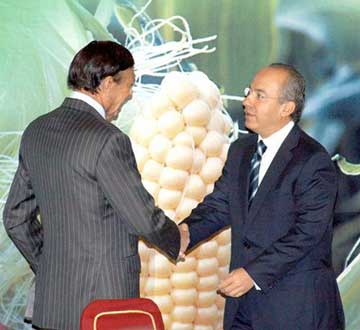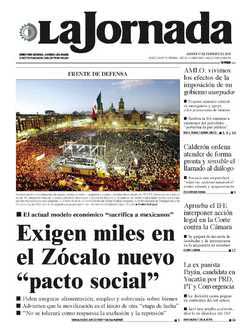
January 2007
 Mexican president Felipe Calderón
(right) joined
by “tortilla king” Roberto González Barrera, owner of the Maseca
flour monopoly
and Banorte bank, in announcing “price ceiling” which was really a 40
percent
price hike. (Photo: Notimex)
Mexican president Felipe Calderón
(right) joined
by “tortilla king” Roberto González Barrera, owner of the Maseca
flour monopoly
and Banorte bank, in announcing “price ceiling” which was really a 40
percent
price hike. (Photo: Notimex)
The
following is a translation of a leaflet by the Grupo Internacionalista
distributed at a January 31 protest in Mexico City.
2007 began
with a
spectacular increase in the price of tortillas, a staple of the Mexican
diet,
as basic as bread in the United States. After going from 6 to 7 pesos
per kilo
(roughly 25 to 30 cents a pound) during November and December of last
year, by
the second week of January the price of tortillas had shot up to 12
pesos (50
cents a pound) in many markets in Mexico City and as much as 18 pesos
(75 cents
a pound) in some cities around the country. Forgetting his previous
declared
opposition to price controls, in order to escape the prospect of
massive
protests the new government of Felipe Calderón announced a price
ceiling of 8.5
pesos. In reality, this was not a blow against speculation but a
40-percent
rise in the price of tortillas, on top of a 28 percent hike in the
price of
subsidized milk. The new price for tortillas was labeled “voluntary,”
and it
only affected a small part of the market. Not by accident,
Calderón was
accompanied by various tortilla manufacturing magnates as he announced
the
measure.
Now the
Party of the
Democratic Revolution (PRD) led by Andrés Manuel López
Obrador and the Broad
Progressive Front (FAP – consisting of the PRD, the Party of Labor and
Democratic Convergence) in “strategic alliance” with “independent”
labor groups
have announced a “mega-march” to protest against the price increases
for basic
commodities. But what is this popular
front calling for? The bourgeois “opposition” which is calling this
demonstration announced that it would undertake legal proceedings
“against
whoever is responsible” for hoarding and speculation – as if they
didn’t know
who the people are! They are also proposing to set up a trust fund to
subsidize
tortillas, such as existed in the period when the Conasupo (National
Company
for Popular Supplies) handed out “tortibonos”
(cards entitling families to a certain quantity of tortillas per day,
according
to the number of family members). But beware. According to the
neo-liberal
schema, these reduced prices would not be for everyone but only for the
neediest. In fact, López Obrador is nothing but a “neo-liberal
with a human
face,” and his aim is to control the protests and keep them
circumscribed within
the capitalist framework.
An increase
in the price of
tortillas is a brutal attack on the livelihood of the working
population. For
many families with limited resources, tortillas constitute a large part
of
their diet. And the reality is that the starvation policies of the new
regime
only accentuate what at bottom is nothing but an inescapable trait of
capitalism. For that reason, in order to combat the tortillazo
(the tortilla attack) it is necessary to mobilize the
workers against the capitalist system itself. In order to make genuine
price
control a reality, it is urgently necessary to form worker-neighborhood supply
committees with the power to shut down, on their own,
businesses which
do not respect the specified price, to ensure an adequate supply of
flour and
to seize the stocks from the hoarders. And since those who are really
behind
the tortilla war are the big monopolies, it is necessary to impose workers
control over the whole chain of production and distribution of
grain,
flour and dough. To combat the speculative networks, it’s necessary to
impose workers
inspection of the accounting books of the agro-industrial giants.
We also
fight for a sliding
scale of wages in order to counter the effects of inflation
(wages
should be raised according to the rate of inflation), and for a sliding
scale of working hours, in order to put an end to unemployment
and to
distribute the available work among all workers. Such measures will not
be
undertaken by any capitalist government, whether of the PAN or the PRD
and its
allies. Various components of the FAP, such as the capitalist farmers
of El
Barzón for example, are linked (although in a subordinate
fashion) to the
agro-industrial chains. We do not call for action by the PAN regime,
which
wants to impose a value-added (sales) tax even on medicines and food.
In order
to combat the government policy of price hikes, it is necessary to break
with the López Obrador popular front and mobilize the
working masses
under the leadership of a revolutionary
workers party that
fights for a workers and peasants government
to undertake international
socialist revolution.
This crisis
has been
generated not only in Mexico. Among the various factors behind the
increasing
cost of tortillas, the rise in price of corn on the international
market has
been cited, due in part to the increasing use of the grain to produce
ethanol.
In addition, there is the increase in price of natural gas and
gasoline, and
other raw materials. While all these factors have had an effect, the
speed of
the price increase for tortillas is the result of a shortage of white
corn
flour, due to hoarding by the large companies that monopolize the
sector:
Minsa, owned by Raymundo Gómez Flores (former head of the Banca
Cremi banking
chain), Grupo Maseca (Gruma) of Roberto González Barrera (owner
of the Banorte bank) and the international
agro-industrial giant Cargill. This oligopoly is the direct
result of
the privatization of the industry carried out in the last two PRI
administrations, of Carlos Salinas de Gortari (1988-94) and Ernesto
Zedillo
(1994-2000), and more generally, of the policies implemented as part of
the
North American Free Trade Agreement (NAFTA),
According
to journalist
Luis Hernández Navarro, from 1994 to date, the price of
tortillas has gone up
by 738 percent (La Jornada, 16 January). Over the same period,
the
minimum wage has only tripled. What this means is that today, the
minimum wage
buys less than half of what it did 13 years ago. With its
economic
policies, the new government is really taking tortillas from the tables
of
millions of working people and urban and rural poor. But the
alternative is not
to go back to the old PRI system, as the PRD suggests. Hernández
Navarro offers
an idyllic description of that “model”:
“In the name of
modernization, the new model dismantled a framework in which the state
regulated the market by establishing price guarantees and regulating
imports….
“The former model
stimulated production by guaranteeing farmers a fixed price for their
products,
providing credit and technical assistance. In order to protect internal
prices,
the government controlled how much grain entered the country through
export
permits. Conasupo bought up about 15-20 percent of the harvest and
through its
affiliates distributed it to remote communities that lacked sufficient
supplies.”
The reality
is that
Conasupo was notorious for corruption. When it was headed by
Raúl Salinas, it
served as his source for his illicit funds, using practices such as
importing
and selling contaminated milk. The producers were subject to blackmail
by PRI
managers who controlled the silos and the purchase of the grain
harvest. On the
other hand, neither the poverty of small peasants nor forced migration
began 15
years ago.
 Popular
front mobilized tens of
thousands in Mexico City’s main plaza on January 31 to protest rise in
price of tortillas and
call for a “new social pact” chaining workers to the bourgeois populist
PRD.
Popular
front mobilized tens of
thousands in Mexico City’s main plaza on January 31 to protest rise in
price of tortillas and
call for a “new social pact” chaining workers to the bourgeois populist
PRD.
One only
has to read the
book of José Luis Calva, Crisis agrícola y
alimnetaria en México, 1982-1988
(Fontamara, 1988), to see how the consumption of beef, pork, fish,
beans and
bananas dropped by over 25 percent from 1981 to 1986, while grain
imports shot
up. What is true is that with NAFTA, the Mexican agricultural crisis
turned
into a disaster that has depopulated a large part of the countryside of
its men
and youth. It would be normal for a capitalist country, and all the
more so for
an agricultural country like Mexico, to maintain reserves of basic
grains in
order to overcome periodic droughts and market fluctuations such as are
currently taking place. But Mexico cannot do this today because corn
production
has been ruined by massive imports. Calderón’s “solution” is to
intensify this
ruin by importing 650,000 tons of duty-free rice. In doing so, he is
speeding
up the timetable laid out by NAFTA, which calls for eliminating import
duties
on grain starting in January 2008.
Proletarian
revolutionaries, both in Mexico and the United States and Canada,
opposed NAFTA
as a colonialist treaty harmful to the working people of all three
countries.
We also opposed the privatization of state enterprises such as Conasupo
and its
corn processing affiliate, MINSA. But it is not a matter of yearning
for a
“golden age” when Mexico’s capitalist economy consisted mainly of
state-owned
companies. Mexican agriculture has always been subject to the laws of
the
capitalist market. Even before flour production was privatized in 1993,
Mexico’s capitalist governments were imposing industrialized flour to
replace
the production of tortilla flour in small shops. Moreover, by keeping
the cost
of tortillas low and the price of corn high, it was subsidizing Mexican
industrialists by lowering the cost of reproduction of “its” workforce.
In
other words, they were using “food sovereignty” to keep workers
drowning in
poverty due to low wages.
The current
crisis recalls
the situation in May-June 1996, when masses of desperate residents of
working-class suburbs of Monterrey and Durango assaulted freight trains
because
they were starving. The bourgeois populist-nationalist PRD of
Andrés Manuel
López Obrador at most would beg the flour cartel to soften its
monopolistic
practices. But in order to smash these monopolies and expropriate them
in the
interests of the working people, imposing workers control, it’s
necessary to
undertake a struggle for a workers and peasants government. Only
through permanent
revolution that extends north of the border, from Oaxaca to Oaxacalifornia
and the industrial heartland of imperialism, which mobilizes the mass
of poor
peasants and Indians under the leadership of a class-conscious
proletariat and
its vanguard party, will it be possible to emerge from this hell of
poverty and
turn starvation into a bad memory of the past. n
To contact the Internationalist Group and the League for the Fourth International, send e-mail to: internationalistgroup@msn.com